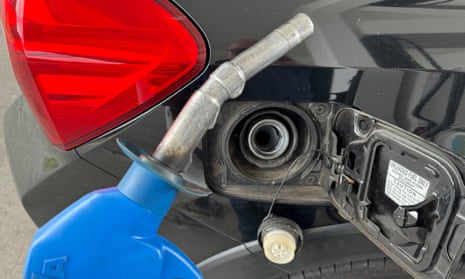
Fuel efficiency standards: Labor unveils proposal, highlighting petrol savings of $1,000 a year for motorists
Coalition-led scare campaign predicted for plan to place yearly cap on emissions for new cars sold in Australia
The Albanese government has unveiled its long-awaited plan for fuel efficiency standards for new cars while highlighting potential savings of $1,000 a year and predicting a Coalition-led scare campaign.
The proposed model, announced on Sunday, would place a yearly cap on the emissions output for new cars sold in Australia to incentivise carmakers to supply low- and zero-emissions vehicles and penalise companies that do not.
Legislation required to create the standards – which only apply to new passenger and light commercial vehicles – would be introduced to federal parliament in the first half of 2024 and take effect from January 2025, the government said.
Australia, along with Russia, remains one of the few countries in the OECD without standards. Industry analysts have routinely warned manufacturers are treating Australia as a dumping ground for heavy-polluting vehicles due to a lack of penalties.
The government’s preferred option is expected to deliver a reduction of 369m tonnes of CO2 by 2050 – equivalent to the last six years’ of emissions from light vehicles in Australia.
The climate change minister, Chris Bowen, pitched the new standards as a cost-of-living measure, given that new vehicles sold in Australia are about 40% less efficient than those sold in the EU.
“Australians are paying more than they need to for petrol,” Bowen said.
Car manufacturers that failed to meet the standards across their entire fleet would face a financial penalty from 1 January 2025. The proposed fine was $100 for every gram over the target.
“We expect companies to comply with the law,” Bowen said on Sunday. “They don’t like the bad press that comes with not meeting fuel emissions standards and that’s why the system works in all comparable countries.”
An analysis released by the government claimed that by 2028 the standards would save a new car owner $5,170 over five years. It also suggested that over the life of the vehicle, Australians could save about $17,000 by paying less money for fuel.
The Electric Vehicle Council’s chief executive, Behyad Jafari, welcomed the announcement and agreed the new standards would save consumers money and provide them more choice.
“Because previous federal governments failed to introduce new vehicle efficiency standards, some car manufacturers have treated Australia as a dumping ground for their most inefficient models,” Jafari said.
The Climate Council chief executive, Amanda McKenzie, called for the standards to be fast-tracked and introduced before the end of 2024.
“Many Australians are doing it tough right now, with petrol one of the expenses causing the most financial stress for households. At the same time, pollution from inefficient petrol-guzzling cars is fuelling harmful climate change,” McKenzie said.
after newsletter promotion
The NRMA described the new standards as “a responsible and achievable option” that would reduce emissions, save consumers money and increase competition.
“Australia could not continue down the path of voluntary targets as it left us behind when it came to choice and the NRMA is strong advocates for choice so that motorists can buy the cars they wish to drive,” said the NRMA chief executive, Rohan Lund.
“A business-as-usual approach meant that Australian families and businesses were not benefiting from the best technology designed to reduce fuel consumption.”
Despite praise from many industry groups, senior ministers are mindful the opposition may try to repeat a scare campaign rolled out during the 2019 federal election campaign.
The then prime minister, Scott Morrison, claimed Labor’s electric vehicle policy would “end the weekend”.
“Let me predict a few scare campaigns,” Bowen said. “This is not a requirement on car manufacturers not to send any particular brand or model to Australia. It’s not a restriction on what Australians can buy. You can still buy a used SUV or a ute or whatever you like.”
On Sunday the Nationals leader, David Littleproud, accused the government of trying to take away the country ute and of discriminating against regional people.
“We can’t let ideology get in the road of practical reality,” Littleproud told the Nine Network.
“If you take away particularly utes, they’re tools of trade, particularly for people, not just tradies in the cities, but also people in the bush. And if you put a tonne on the back of an electric ute at the moment, you don’t get far.”